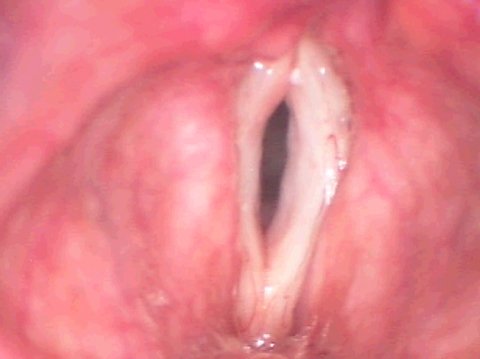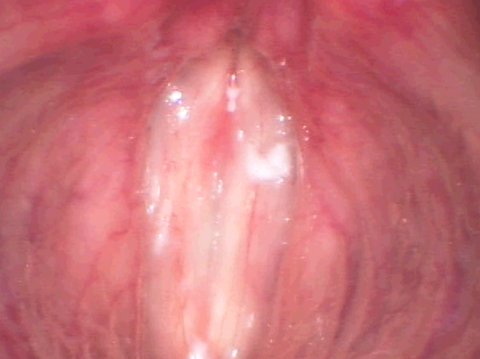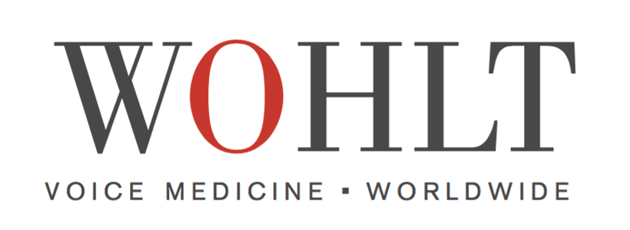What does the term “presbyphonia” mean?
Over the course of their lifetimes, peoples’ voices change as a natural function of aging. The hallmark full, youthful resonant voice gradually turns weaker or wobbly with time, usually becoming breathier and less stable.
The anatomical and functional changes responsible for this are primarily due to incipient atrophy of the vocal musculature. The vocal folds lose muscle mass and, as a result, become thinner due to their reduced volume. This process is called vocal cord atrophy.
In addition, the tissue layer of Reinke’s space required for a good voice becomes thinner and less flexible.
The voice changes related to the aging process can vary remarkably from individual to individual. Many people will keep their resonant, tonally rich voices up into old age, while others start exhibiting markedly audible hoarseness beyond the age of 50.
Vocal folds before anti-aging surgery

Vocal folds after anti-aging surgery


What signs and symptoms can occur as a result of the voice’s aging process (presbyphonia)?
The aging voice (presbyphonia) is usually characterized by a higher pitch in men and a lower pitch in women. The average speaking pitch is markedly changed. Sometimes, this is mixed in with a slightly rough and raspy tonal quality.
However, as the decreased thickness and reduced volume of the vocal muscles
progress to full-blown vocal cord atrophy, i.e., to a thinning of all the vocal cord structures, the vocal folds lose their ability to close completely to produce voice. As the result, the individual speaks with a breathy and airy voice. Some elderly people's voices can become so soft and breathy that they are hardly able to communicate.

What treatment options are available?
- Voice therapy
- Voice surgery
In more mild forms of vocal cord atrophy, attempts should first be made to improve the voice by vocal exercises. If such exercise regimens do not produce a satisfactory voice quality, then is the time to consider therapeutic management by phonosurgical intervention.
The augmentation of both vocal folds with fat tissue or artificial materials has proven itself suitable for the phonosurgical management of this condition.
Dr. Wohlt's preferred operative method involves the injection of autologous fat tissue into both vocal folds. In this way, the muscle mass that has thinned as a result of age-related processes is replaced with implanted fat. The vocal folds regain youthful volume and the patient's voice rings out again with the resonant and rich quality it had before. The voice sounds “rejuvenated”. The phonosurgical options for managing vocal cord atrophy and the aging voice are described in greater detail under Anti-Aging Surgery.
Example of phonosurgical treatment for Vocal Cord Atrophy

Case Report: The Aging Voice – Presbyphonia
A 65-year-old retired teacher had been noticing an increased hoarseness in her voice for about a year. She reported her voice to be breathy and raspy, she had effort in speaking, conversing against moderate ambient noise was hardly possible. Friends were repeatedly telling her about the change in the quality of her voice.
The woman occasionally smoked 3-5 cigarettes a day, but had not put her voice under any unusual stress over the last 2 years.
The videostroboscopic examination performed by the laryngologist revealed excavated vocal folds of markedly reduced volume on both sides which were not able to close when she tried to produce sound. Her voice had an abnormal raspy quality and sounded soft, overall much older than the woman's actual age belied.
The patient was recommended to undergo a phonosurgical procedure. In a single session, Dr. Wohlt injected autologous fat tissue into both of her vocal folds according to his preferred method. Postoperatively, both vocal folds were of nearly exactly the same size and vibrated symmetrically, achieving complete closure.
The quality of her voice was strong and clear and her average speaking pitch was within the normal range. This former teacher found her own voice to be pleasant, have a much fresher tone and sound 15 years younger than before surgery.




